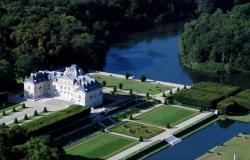
the essential
The Elementary Foncière de la Ferme de la Rauze acquired 11 hectares of land in 2021 thanks to 190 donors and more than 110,000 euros raised. Seven young farmers have since settled there in GAEC. The Farm is launching a new collection on June 15 to perpetuate its land unit and acquire around ten additional hectares.
Located in the commune of Le Bourg, the farm has been cultivating organic land for 30 years. Collective, made up of 7 young associates, student of Bayeux breed pigs and Salers cows for the meat And THE milk. Cultivated cereals in wheat, rye, buckwheat or sunflower are transformedes in the flour mill, THE bakery and L’oil mill on the farm.
Together they built a structure that allowed them to speculate on agricultural land. This is how agricultural land was born. This June, the project will take a new step with the acquisition of 10 additional hectares. To make this agricultural opportunity a reality, a call for crowdfunding to raise €70,000 will be launched on the helloasso platform.
Agricultural and food autonomy as an issue
Recently, vegetables of season grow in open fields and in the greenhouse. The entire production is sold directly from the farm or on the Figeac and Gramat markets. “We are aiming for cereal autonomy for farm animals and for bread production” summary Beryl Brushassociated peasant within the GHASEC who rents the farm land to there Elemental Real Estate.
A local human adventure to make land a common resource
“La Foncière Élémentaire is the culmination of a long reflection” explains Serge musselsone of the transferors of La Rauze and current mayor of Le Bourg. “When we started thinking about passing on this farm, we were 3 partners. Basile, my son and his partner Béryl were employees. They didn’t want to take over this farm on their own,” says Serge Moulènes. “We have defined the essential criteria for choosing future partners. We wanted the new partners to position themselves as entrepreneurs serving local food needs with the desire to work collectively and with respect for living things. We have a responsibility to provide food to those who cannot produce it.”
DDM David Naulin
These are the criteria that made Mathilde Burgière want to join the GAEC. “On the farm, we are all versatile. I found it important to work collectively with a meaningful social model. It’s humanly rich and this formula allows us to free up personal time. I find myself in this project which carries strong values: producing locally by making something beautiful and good.”
“We thought about the endowment fund which settles the question of the social share. Once the donation is made, it is irrevocable,” explains Serge Moulènes. “It allows the elementary landowner to own the land indefinitely and to rent it within the framework of the rental status with environmental clauses which make it a mission of general interest. The project also responds to social and economic dimensions. If we don’t need to sell land to each new generation it costs less to produce. A farmer who buys land must cover his investment by selling his products. There is therefore an additional cost for the consumer. Such an approach to transmission allows you to reduce the cost of products. There is also an educational dimension. Bringing these questions of food sovereignty to a territory does not only concern farmers, it is a question that we must take on collectively between producers and consumers.”
La Foncière Élémentaire thus removes the obstacles to access to land that are too often experienced as an obstacle course by the candidates for the installation. This agricultural land then becomes the permanent property of a structure which is not a company. of capital, which is not owned by anyone, which has an independent legal existence. One way to respond to current issues of food sovereignty. “ This model facilitates our installation » confirms Mathilde Burgière. “It’s much simpler on the financial side, I didn’t need to buy land and buildings. »
A pact between farmers and consumers
The legal form of the Foncière is based on an endowment fund recognized as being of general interest which allows a tax deduction of 66% on donations collected from citizens. On June 15, the land so launch A new crowdfunding on helloasso for harvester them 70,000 euros required to the acquisition of 12 hectares of additional land.





